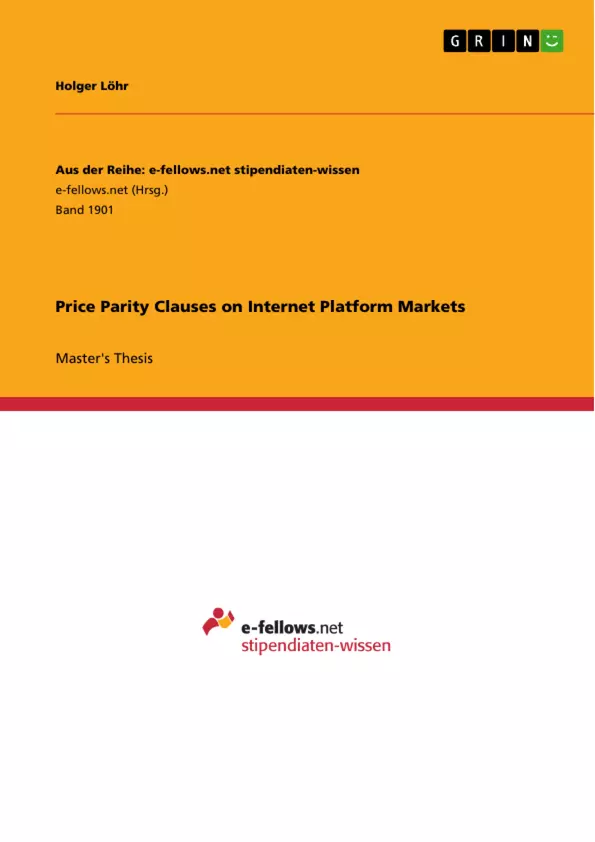Recent years have witnessed a remarkable increase in internet platform markets which have become the preferred venue of interaction amongst a growing number of buyers and sellers. The ability of the internet to enable sellers reach a greater number of consumers shows that there is a high potential for growth of the internet market, with effects on competition. Following a 2013 report by the German Antitrust Authority “Bundeskartellamt” on “Vertical Restraints on the Internet Economy”, it is clear that the internet significantly reduces transaction costs and thus increases competition to the benefit of consumers. The increase in competition among sellers, producers and retailers has led to an adoption of different forms of vertical restrictions on internet platforms which have come under the scrutiny of antitrust authorities. This thesis aims to analyze vertical restraints on internet platform markets based on the investigation of Amazon.com, Inc. by the “Bundeskartellamt” for its use of a price parity clause. This clause was introduced in Germany and in the United Kingdom in 2010 in the contract between Amazon and sellers using its platform and prohibited them from setting lower prices on other platforms, including their own websites, than the prices they set on Amazon.
Inhaltsverzeichnis (Table of Contents)
- Introduction
- Legal framework and case study
- Legal perspective
- The Amazon case
- Platform Markets
- Definition
- Critical mass
- Pricing
- Multi-homing
- Price Parity Clauses
- General
- Meeting-Competition
- Most Favored Customer
- Combinations
- Exclusive contracts
- Predatory pricing and limit pricing
- Application on Internet Platform Markets
- Meeting-Competition
- Most Favored Customer
- Exclusive contracts
- Predatory pricing and limit pricing
- Conclusions
Zielsetzung und Themenschwerpunkte (Objectives and Key Themes)
This master thesis aims to analyze the impact of price parity clauses on internet platform markets. It focuses on the legal framework, the economic theory behind platform markets, and the specific application of price parity clauses in this context. The thesis examines the potential consequences of these clauses for competition, consumer welfare, and the overall development of the internet economy.
- The legal framework and regulation of price parity clauses
- The economic characteristics of platform markets
- The potential impact of price parity clauses on competition and consumer welfare
- The role of platform operators in shaping market dynamics
- The future of internet platform markets in the context of evolving regulations and technological advancements
Zusammenfassung der Kapitel (Chapter Summaries)
The introduction provides a comprehensive overview of the significance of internet platform markets and the growing importance of price parity clauses. It highlights the economic and legal challenges posed by these clauses, setting the stage for the subsequent analysis.
Chapter 2 delves into the legal framework governing price parity clauses, examining relevant case law and the legal perspective on their potential antitrust implications. It focuses on the Amazon case, which has been a pivotal point of contention in the debate surrounding these clauses.
Chapter 3 provides a detailed analysis of platform markets, defining their key characteristics, including critical mass, pricing strategies, and multi-homing. It explores the economic forces that drive platform market dynamics and their influence on competition and consumer behavior.
Chapter 4 examines different types of price parity clauses, including meeting-competition, most favored customer, and exclusive contracts. It analyzes the potential economic and legal implications of these clauses, considering their impact on market power and consumer welfare.
Chapter 5 applies the theoretical framework developed in previous chapters to the specific context of internet platform markets. It analyzes the effects of different types of price parity clauses on competition and consumer welfare, highlighting potential concerns and benefits.
Schlüsselwörter (Keywords)
This thesis focuses on price parity clauses, platform markets, competition, consumer welfare, antitrust law, internet economy, Amazon, platform operators, multi-homing, and legal framework. It investigates the economic and legal implications of price parity clauses and their impact on the dynamic and competitive nature of online marketplaces.
Frequently Asked Questions
What is a price parity clause?
A price parity clause is a contractual agreement that prohibits sellers from offering their products at lower prices on other platforms or their own websites than on the platform in question.
Why was Amazon investigated by the German Antitrust Authority?
The "Bundeskartellamt" investigated Amazon for its use of price parity clauses, which were suspected of restricting competition and potentially harming consumers.
What are the economic characteristics of platform markets?
Platform markets are characterized by network effects, the need for a critical mass of users, specific pricing strategies, and the phenomenon of "multi-homing" (users using multiple platforms).
How do price parity clauses affect consumer welfare?
While they can reduce transaction costs, they may also lead to higher overall price levels and prevent smaller platforms from competing through lower prices.
What is "multi-homing"?
Multi-homing refers to the situation where buyers or sellers use multiple competing internet platforms simultaneously to reach a wider market or find better deals.
- Quote paper
- Holger Löhr (Author), 2014, Price Parity Clauses on Internet Platform Markets, Munich, GRIN Verlag, https://www.grin.com/document/335529



